Abstract
The article shows the necessity of studying the reflective bases of cognitive states, shows the significant role of reflection in the regulation of cognitive mental states of students in the course of educational activity. The aim of the study is to identify the role of reflective processes in the mental regulation of students’ cognitive states. The study involved 98 people; all of them are students of the Kazan University of different areas of study. The average age of students is 21. In the article used both domestic and foreign techniques, as well as the original author's methodology for diagnosing reflective processes. Among them, the list of 24 cognitive mental states was used. Students had to choose cognitive states that they most often experience in the process of learning activity. Correlation and frequency analysis, as well as analysis of variances method were used. The authors found that most often in the course of educational activity students experience states of interest, concentration, curiosity and inspiration. The development of reflective processes of recognition, awareness and identification, as well as self-reflection, improves the cognitive components of states and contributes to the increase of adequacy, controllability and purposefulness of behaviour in the course of students' learning activities.
Keywords: Cognitive statereflectionstudentseducational activity
Introduction
Reflection takes a special place in the process of educational activity, determining the manifestations of mental states. In the process of learning, reflection acts as a mechanism of self-knowledge, self-organization, self-determination and the basis for the independent activity of students. The formation of reflective abilities is especially necessary for productive educational activity, as they perform the function of self-regulation and control of activities and contribute to the development of the student's personality (Prokhorov, Yusupov, & Chernov, 2011).
Nowadays, a number of studies have actively carried out studies of meta-emotions and their influence on the direction of emotional reactions and the regulation of cognitive activity (Mitmansgruber, Beck, Höfer & Schüßler, 2009). In other works studied metacognitive states, that arise in the process of solving intellectual problems, for example, feelings of difficulty of the problem being solved and its influence on the productivity of students (Efklides, 2001).
Karpov and Skityaeva (2005) found that self-control acts as a regulative reflection and subjective assessment of one's own actions. Self-control can have a significant impact on the general background of intellectual activity by actualizing the relevant mental states. For example, increased self-control, which is a consequence of the current focus of subject on himself, a person constantly analyzes his thoughts and behavior, evaluates himself negatively, cares about the impression and, overall, gives a negative assessment of his own state.
Problem Statement
In the study of mental states in educational activity arises the problem of isolating a special class of states associated with the process of cognition of the subject called as cognitive states. The question of the content of cognitive states, their structure, functions, dynamics, connections with other psychological phenomena (processes and properties), including other states, remains open. In our earlier studies were found regularities in the manifestation of cognitive states, related both to external and internal factors (Prokhorov, Chernov, & Yusupov, 2016).
Research Questions
To justify cognitive states as a psychological factor in the development of the intellectual sphere of the subject.
To reveal the most common cognitive state in the course of educational activity of students.
To find out the general characteristics of the studied cognitive states.
To reveal the most common cognitive mental states of students with different cognitive and regulative reflection.
To show the practical value of the research
Purpose of the Study
The purpose of this study is to identify the role of reflective processes in the mental regulation of cognitive states in the course of students' learning activities.
Research Methods
An empirical study was conducted in accordance with the purpose of the study in which 98 people of both sexes took part, all are students of Kazan University. The average age of students is 21 year.
The following methods were used for the study:
Author's technique for diagnosing reflective processes: recognition, awareness and identification. The method is aimed at studying the mental bases of reflective processes (Chernov, Yusupov, 2015).
Technique "Relief of the mental state of the individual", assessing the main aspects of the mental state: the features of mental processes, physiological reactions, experiences and behavior (Prokhorov, 2004).
"Standard semantic differential" method by Osgood (1978). This technique allows to assess the mental state by the help of the proposed set of antonym scales.
Method of M. Grant for assessing the level of expression and focus of reflection, including the scale of self-reflection and social reflection (Karpov & Skityaeva, 2005).
Methodology "Ability to self-management" (Peysakhov, 1974).
Method for diagnosing reflectivity (Karpov & Skityaeva, 2005).
The list of cognitive mental states, consisting of 24 cognitive mental states (Prokhorov, Yusupov, & Chernov, 2011). Students had to choose several states that they most often experience in the process of learning activities. Correlation and frequency analysis, as well as ANOVA, were used to process the obtained data. The results were processed using SPSS 16.0.
Findings
As a result of the study, it was found that during the educational activity students experience a very wide range of cognitive states. Absolutely all the states presented in the list were marked by students during the lesson. However, it can be noted that among them there are cognitive states, which are marked by the majority of subjects and are experienced most often during the educational process. It was found that most often during the educational activity students experience the state of interest (12% of the total number of elections), concentration (9%), curiosity (8%) and inspiration (7%). The remaining states are represented with a lower frequency of manifestation, which is shown in Figure
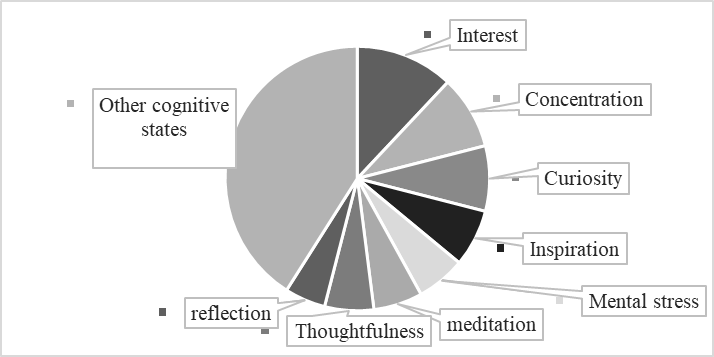
As shown in Figure
In addition, it was established that the development of reflective processes of recognition, awareness and identification, as well as self-reflection, improves the cognitive components of states and contributes to the increase of adequacy, controllability and purposefulness of behavior in the experience of cognitive mental states by students during educational activities.
It was found that the general characteristics of the cognitive mental states studied are the indicators of their awareness and controllability, which acts as a system characteristic of cognitive states. Assessing the cognitive states that have been allocated, students note a positive attitude towards them. Healthy, adequate and good these are descriptions of interest and reflection states. So, the characteristic of poise is peculiar for curiosity and reflection. The connecting state is thought, which has common evaluation characteristics with curiosity and interest.
Further, as a result of the study, the following patterns were established. People with high reflectivity are much less likely to experience a state of dreaming (2 choices), unlike those with low reflection (31). Reverse regularity is found for the state of mental stress: students with high reflectivity are much more likely to experience this state (16) in comparison with those who are characterized by low reflectivity (2). That is, highly reflective students are less likely to have a dreaming state, and, at the same time, are more likely to be in a state of mental stress, which means they are more constrained and clamped during training sessions. In the rest, significant differences in the experienced cognitive states are not revealed.
However, there are obvious differences in the frequency of experiencing cognitive states in individuals with different levels of cognitive and regulatory reflections. When the reflection was divided into cognitive and regulatory components, interesting regularities were discovered. It is widely known, that cognitive reflection is more closely related to the awareness of the states and the concentration of people on their own experiences and emotions. At the same time, regulative reflection is directed at regulation, manifested in conscious control over emotional-volitional and mental processes.
Let us turn to the results of studying the cognitive component of reflection. Figure
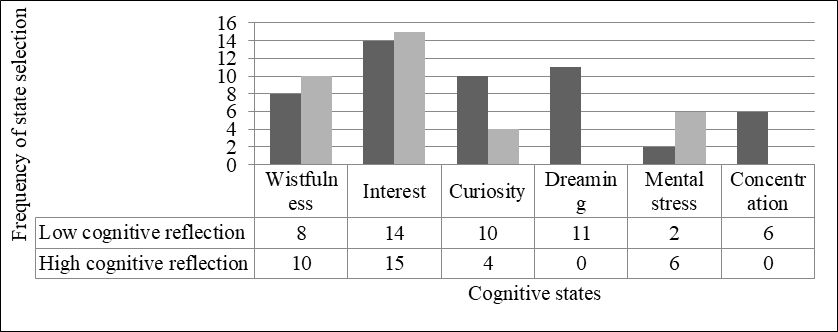
As it can be seen from the figure
Next, let us turn to the results of the study of regulatory reflection and its impact on cognitive states of students in the course of learning activity (Figure
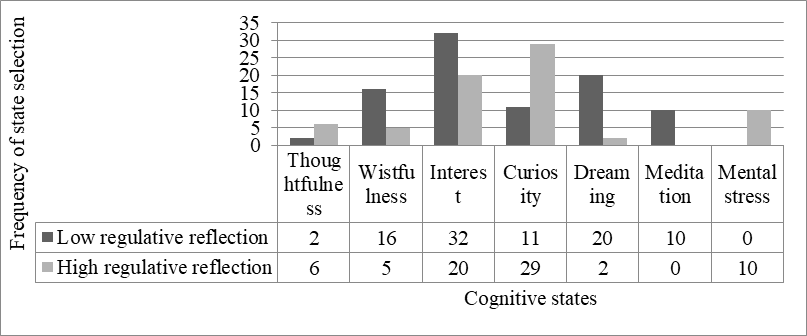
As shown in Figure
On the bases of established regularities, the states of interest and concentration were identified as the most typical for the students' academic activity. The influence of self-reflection (reflection of one's own state) on substructures of the state of interest was analysed. As a result of analysis of the variance (ANOVA), the influence of cognitive reflectivity on the state of interest was established, in particular, on such basic substructures as experience (p≤0,037) and behaviour (p≤0,05). As shown in Figure
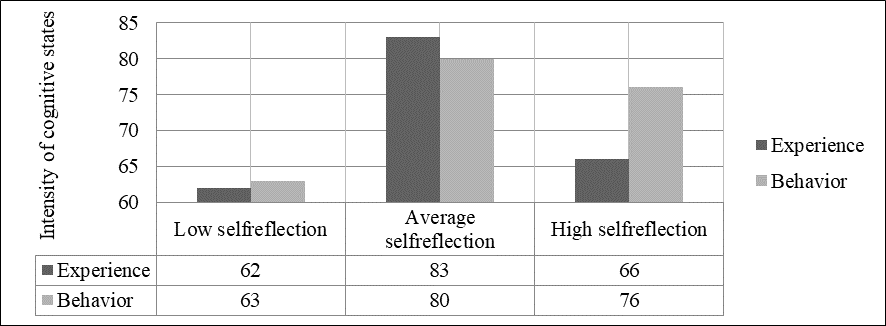
The situation is somewhat different in the case of another typical mental state in tense educational activity. Only a few reflective indicators influence the substructures of the state of concentration. Among them, we should highlight the variable of actual reflection (cognitive component). Consider the influence of the current reflection of activity on the mental state of concentration. Influence was established on the average for all substructures (p≤0,014), as well as on the indicator of experience (р≤0,028), which is clearly reflected in the figure
As shown in Figure
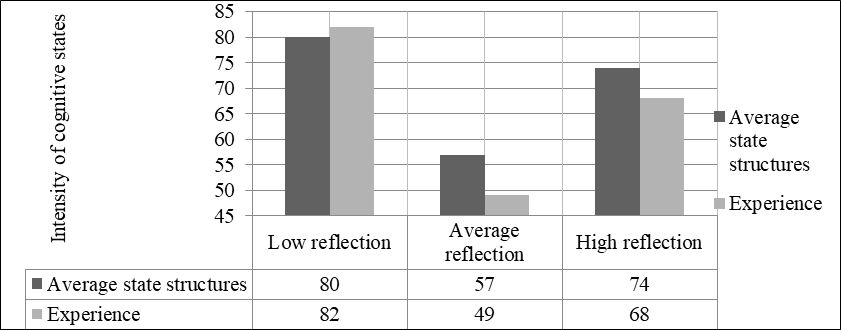
Highly reflective students experience more intense state of concentration. However, they reflect not on the subject of activities (ticket issue), but on their own feelings about their mental state. In turn, the low reflective all their attention direct to external activity, focused on the task, and the intensity of their state is higher.
Nowadays, in cognitive psychology, the question of intellectual reflection is being intensively developed. In the articles of Paris & Winograd (1990) shown that students can improve their learning by studying their own thinking. In the works of Flavell (1976) introduced the concept of "cognitive monitoring" as the ability to introspective analyze and track the progress of their own intellectual property and certain aspects of it in the course of training and other forms of activity. In the studies of Kholodnaya (2002) noted that the more expressed metacognitive mechanisms of regulation of intellectual activity, the less the subject turns to cognitive reflection. At the same time, in a number of works an inverse relationship is shown. Therefore, in the studies of Wilson and Schooler (1991), the inclusion of the process of reflection on the grounds of their decisions led to a decrease in the objectivity of judgments about the quality of the lecture course. The results of this study once again confirm the complex form of interaction between reflective processes and the productivity of students' cognitive activity.
Conclusion
It is theoretically justified that cognitive states act as a psychological factor in the development of the intellectual sphere of the subject and, first of all, the thought processes and reflection.
It is revealed that most often in the course of educational activity students experience states of interest, concentration, curiosity and inspiration.
It is established that the development of reflective processes of recognition, awareness and identification, as well as self-reflection, improves the cognitive components of states and contributes to the increase of adequacy, controllability and purposefulness of behavior when students experience cognitive mental states in the course of educational activity. It is found that the general characteristics of the studied cognitive states are the indicators of their awareness and controllability, which act as a system characteristic of this class of states.
It has been shown that students with high level of cognitive reflection experience the state of interest and thought, and low reflective students experience states of dreaming and concentration. High regulatory component of reflection is related to the experience of curiosity, thoughtfulness and mental stress, and low – the state of interest and thoughtfulness.
It is established that the state of interest in individuals with high reflection of their experiences is characterized by high behavioural activity with a low degree of experience. The lowest degree of concentration is characteristic of individuals with an average level of current reflection.
The results obtained will be useful in the further study of cognitive mental states and their use in practice will contribute to the development in schoolchildren and students of a conscious experience of cognitive states in learning activity.
Acknowledgments
The work is performed according to the Russian Government Program of Competitive Growth of Kazan Federal University. The study was carried out with the financial support of the Russian Foundation for Basic Research, project No. 17-06-00057a.
References
- Chernov, A.V., & Yusupov, M.G. (2015). Psychology of meta-knowledge: theoretical and applied aspects: a textbook. Kazan: Otechestvo.
- Efklides, A. (2001). Metacognitive experiences in problem solving. In Trends and prospects in motivation research (pp. 297-323). Springer, Dordrecht.
- Flavell, J. H. (1976). Metacognitive aspects of problem solving. The nature of intelligence, 231-235.
- Karpov, A. V., & Skityaeva, I. M. (2005). Psychology of metacognitive processes of personality. Moscow: Institute of Psychology of the Russian Academy of Sciences.
- Kholodnaya, M. A. (2002). Cognitive styles: the nature of the individual mind: a textbook. Moscow: PEER SE.
- Mitmansgruber, H., Beck, T. N., Höfer, S., & Schüßler, G. (2009). When you don’t like what you feel: Experiential avoidance, mindfulness and meta-emotion in emotion regulation. Personality and Individual Differences, 46(4), 448-453.
- Osgood, C. E., Suci, G. J., & Tannenbaum, P. H. (1978). The measurement of meaning. 1957. Urbana: University of Illinois Press.
- Paris, S. G., & Winograd, P. (1990). How metacognition can promote academic learning and instruction. Dimensions of thinking and cognitive instruction, 1, 15-51.
- Peysakhov, N. M. (1974). Self-regulation and typological properties of the nervous system. Kazan: Publishing House of Kazan University.
- Prokhorov, A. O. (2004). Methods of diagnosis and measurement of mental states of personality. Moscow: Per SE. 142-147.
- Prokhorov, A. O., Chernov, A. V., Yusupov, M. G. (2016). On the mechanism of interaction between mental states and cognitive processes in the academic activity of students. Mathematics Education, 11, 569-581.
- Prokhorov, A. O, Yusupov, & M. G, Chernov, A. V. (2011). Structurally functional organization of intellectual states. Uchenye zapiski Kazanskogo Universiteta. Series Humanities, 5, 51-62.
- Wilson, T. D., & Schooler, J. W. (1991). Thinking too much: introspection can reduce the quality of preferences and decisions. Journal of personality and social psychology, 60(2), 181.
Copyright information

This work is licensed under a Creative Commons Attribution-NonCommercial-NoDerivatives 4.0 International License.
About this article
Publication Date
05 September 2018
Article Doi
eBook ISBN
978-1-80296-044-0
Publisher
Future Academy
Volume
45
Print ISBN (optional)
-
Edition Number
1st Edition
Pages
1-993
Subjects
Teacher training, teacher, teaching skills, teaching techniques
Cite this article as:
Prokhorov, A. O., & Chernov, A. V. (2018). Reflective Bases Of Students’ Cognitive States. In R. Valeeva (Ed.), Teacher Education - IFTE 2018, vol 45. European Proceedings of Social and Behavioural Sciences (pp. 149-156). Future Academy. https://doi.org/10.15405/epsbs.2018.09.18

